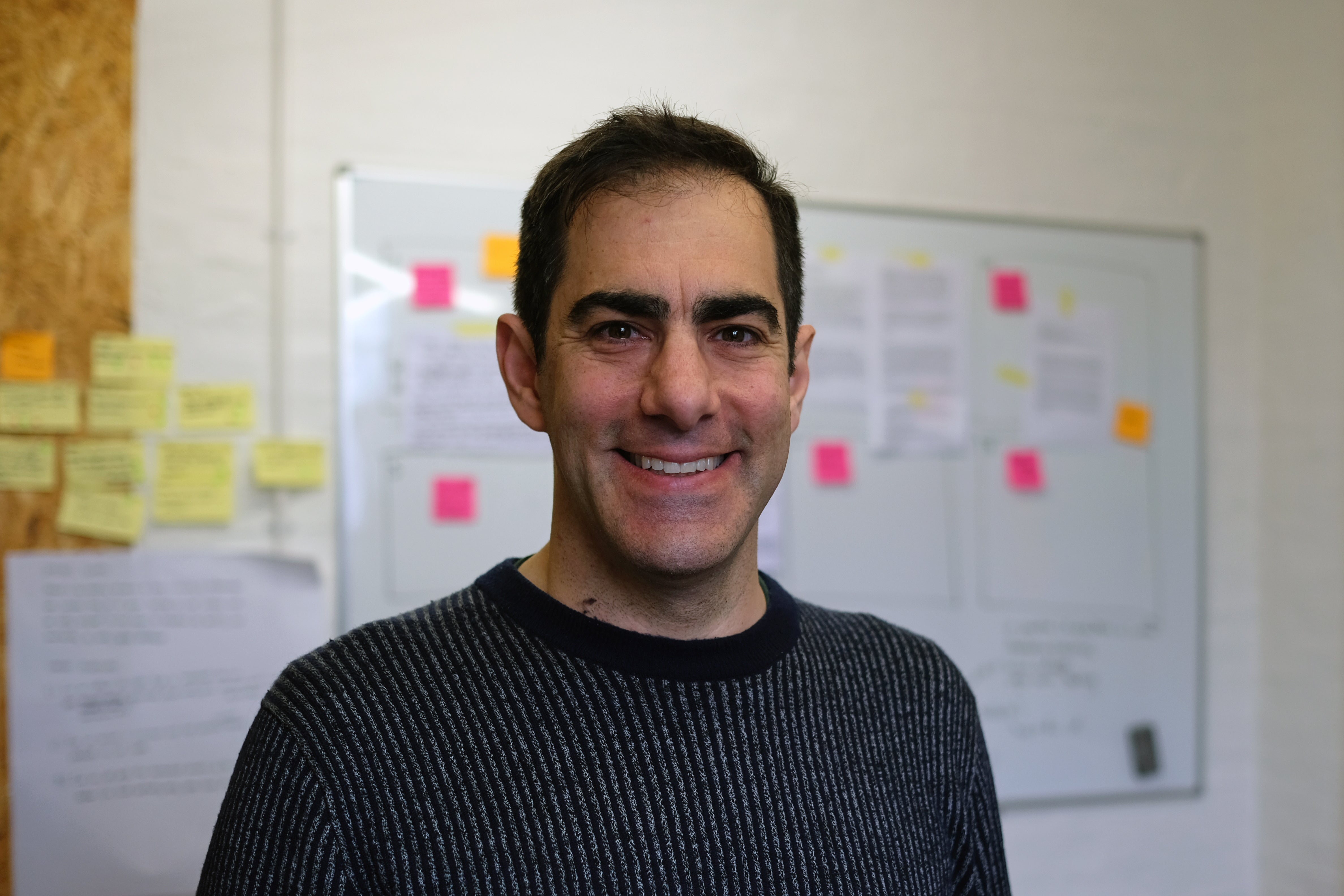‘Top talent doesn’t like to close off options’: The creator of Teach First is now revolutionising pre-school
Brett Wigdortz tells Andy Martin how his ‘tiney’ concept can attract a new generation of graduates


I said I would never go into teaching,” says Brett Wigdortz. So, naturally, he went and set up Teach First. And now he’s launched tiney, a new tech-driven system of pre-school education and childcare.
When I spoke to him, he was sitting in a shed at the bottom of his garden in East Finchley. But he was born in Bruce Springsteen’s hometown, Asbury Park, on the New Jersey shore, an hour out of New York. Most of his family were in teaching. “I was a B+, maybe A- sort of student – good but not great,” he says. “Could do better was the usual report. I was an annoying kid in class.”
Growing up, he tried his hand at a lot of different jobs. He was a strong swimmer and became a lifeguard at the beach while at high school. And he qualified as a FIFA referee aged 16. Now he swims in the men’s pond at Hampstead Heath through the winter, but he did a masters in economics at the University of Hawaii (in Honolulu), where he recalls mostly surfing or playing water polo.
His emphasis at the East-West Centre in Hawaii had been on South-East Asia and he took a job as a journalist in Indonesia. He learned Indonesian, but he ended up joining McKinsey in Jakarta and then being sent on secondment to London in 2001. He was given the task of working out how business could best support education.
He visited a lot of schools in inner London. “You can’t overstate how bad they were. Children were not getting a good education.” He thought the main problem was a shortage of good teachers. “If you get good leadership and teachers, usually kids will get a great education.” While at McKinsey, he had worked on how businesses could attract and retain talent. He applied the same set of principles to attracting talented graduates to teaching. He calls it “the war for talent”. “Deloitte does it, Microsoft does it, why not teaching?”
He wrote a business plan for a thing called “Teach First”, aimed at recent graduates, but then spent the next 15 years putting theory into practice. Wigdortz says that “money is a low motivating factor” for 90 per cent of graduates. “If you look at Deloitte and others, what they talk about in their pitch is ‘making a difference’. The biggest motivation is altruism. People are cynical about it, but most graduates are the opposite of cynical.”
One of his tenets: you don’t want 50-year career plans. “Top talent doesn’t like to close off options,” he says. The governing idea of Teach First was give it a whirl when you graduate. For the experience. You can always do something else later if you like.
Teach First came at the right time in London. Wigdortz was introduced to the then prime minister, Tony Blair, whose mantra was “education, education, education”. The so-called “London Challenge” was to improve schools in London. “And they have improved a lot,” says Wigdortz. “London is now one of the best cities in the world to go to school in, especially in low-income areas. I like to think Teach First had something to do with that.”
Tiney already has around 100 micro-nurseries up and running with another 150 more in the pipeline
In 2009, Wigdortz took his “Teach For All” program, co-founded with Wendy Kapp, to over 50 countries around the world. One of the main functions of education is to increase social mobility and decrease inequality. But all the statistics show that it is hard to “close the gap”. “Most schools prevent the gap from increasing,” says Wigdortz. “A few manage to close it. But it would be better if you could prevent the gap from existing in the first place.”
Which is where the idea for “tiney” (with a lower-case “t”) was born around the end of 2018. What tiney promises to do for pre-schoolers is what Teach First did for older children. The formative importance of the pre-school years is now better understood than ever. A lot of cognitive development takes place in those early years, before formal education begins. “A two-year-old is learning a massive amount through play. The brain is developing hour by hour.” By the age of five, when most children start school, a four-month development gap has already opened up between disadvantaged children and their better-off peers. “That’s a lot when you’ve only been alive for 60 months.”
But of course the stats only give you the big picture. “It’s never too late!” Wigdortz stresses. “You can’t say to a 14-year-old your life is over because of what happened or didn’t happen at age two.”
Teach First had started in secondary schools but expanded into primary schools. Wigdortz says that when he went into reception classes there were a lot of children who could barely speak and were incapable of interacting. “They weren’t school-ready. You could see how teachers were struggling right from the start to try and close the gap.” The goal of tiney is to ensure that kids are “school-ready”.
Teach First managed to attract a new generation of graduates into teaching. Now tiney is applying the same logic to pre-school. “We have under-estimated how important the job is. There are simply not enough early years educators to go round.”
The problem with the existing system is that good nurseries are few and far between and they’re expensive. Tiney is trying to make it more affordable and to increase the number of “micro-nurseries” or “tiney homes”. “Nurseries are too big, generally, for small children. Research shows that kids flourish in a family-style environment with one adult and a small number of children.”
Wigdortz doesn’t much like the phrase “child-minder”. “It sounds so passive. And there’s a sort of stigma attached to it. It sounds like something your grandma might have done in the 1950s. We are trying to change the meaning,” he says.
The way the tiney system works is people can sign up to become pre-school providers. They then get all the training – approved by Ofsted – and the insurance and back-up provided by tiney. “We try to make it as straightforward as possible, it should be a nice user experience, like an Apple operating system.” After a few months they are then ready to go into people’s homes to create a micro-nursery and give the child or children appropriate care and stimulation. The set-up works particularly well for parents that already have a youngster or youngsters of their own that they can bring with them. It’s like airbnb for pre-schoolers, with people using their own homes.
The most powerful piece of research on children 0-3 showed that the single most significant factor in the development of the infant mind is the number of words that children hear and that are addressed to them. Television doesn’t count. “Yes, it’s true,” says Wigdortz, “but the words are part of a larger picture of interaction and attention and engagement and communication.” There are book clubs and neighbourhood events and activities that the kids can get involved in.
The costs are low in comparison with existing nursery provision, but the educator gets 90 per cent and 10 per cent goes to tiney. Wigdortz chose to make tiney a business rather than a charity like Teach First. “We became the largest graduate recruiter in the UK, but charities are hard to grow. I felt this sector really needed to change. It’s tech-focused so it can grow and scale.”
Tiney already has around 100 micro-nurseries up and running with another 150 more in the pipeline. “Hopefully we can grow from there,” says Wigdortz. “We need to go global. It’s a global issue. No country has got this right. Not even Sweden. Hopefully this could work for millions of kids.” Tiney could be huge.
@andymartinink
Join our commenting forum
Join thought-provoking conversations, follow other Independent readers and see their replies
Comments



Bookmark popover
Removed from bookmarks